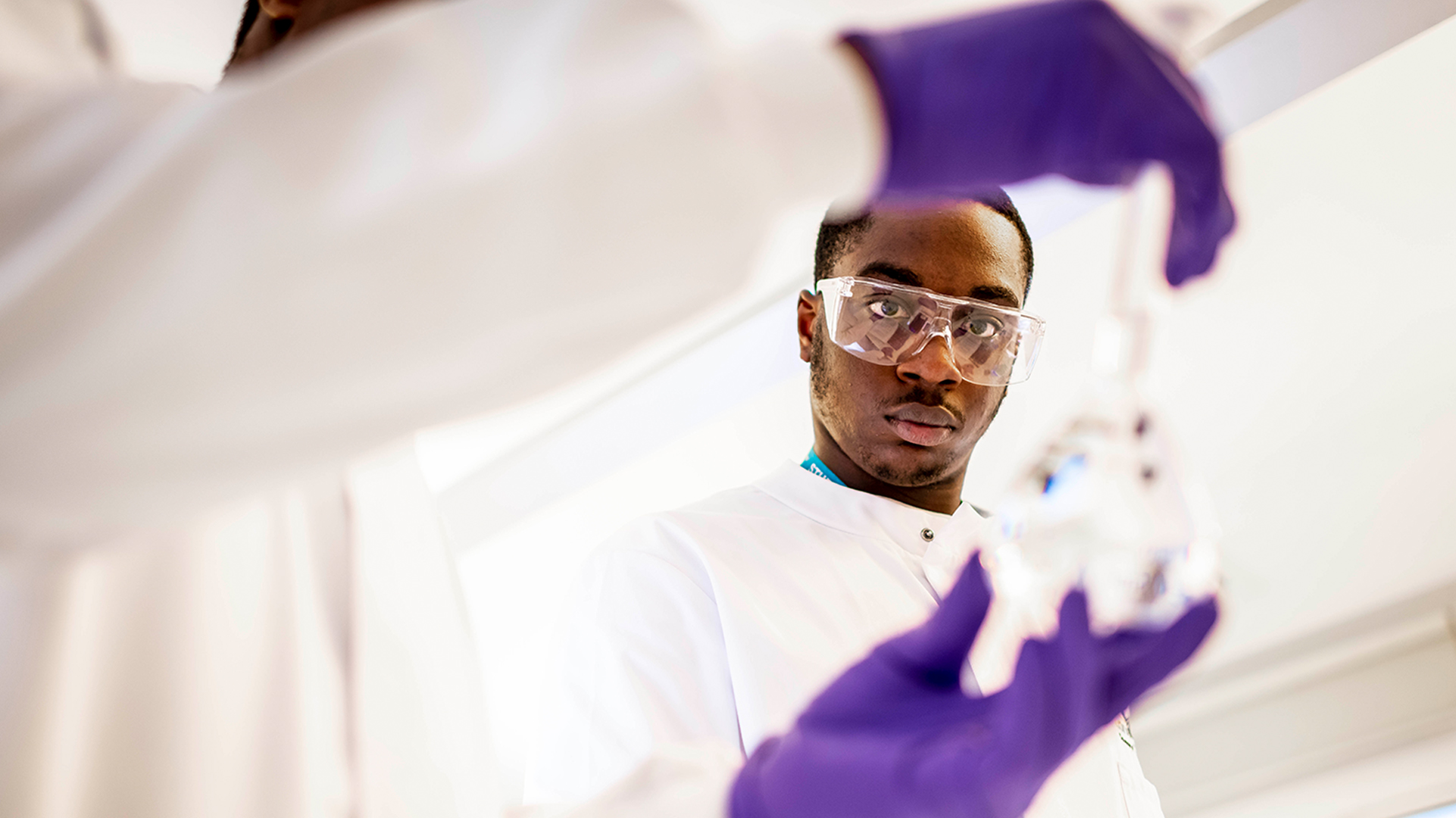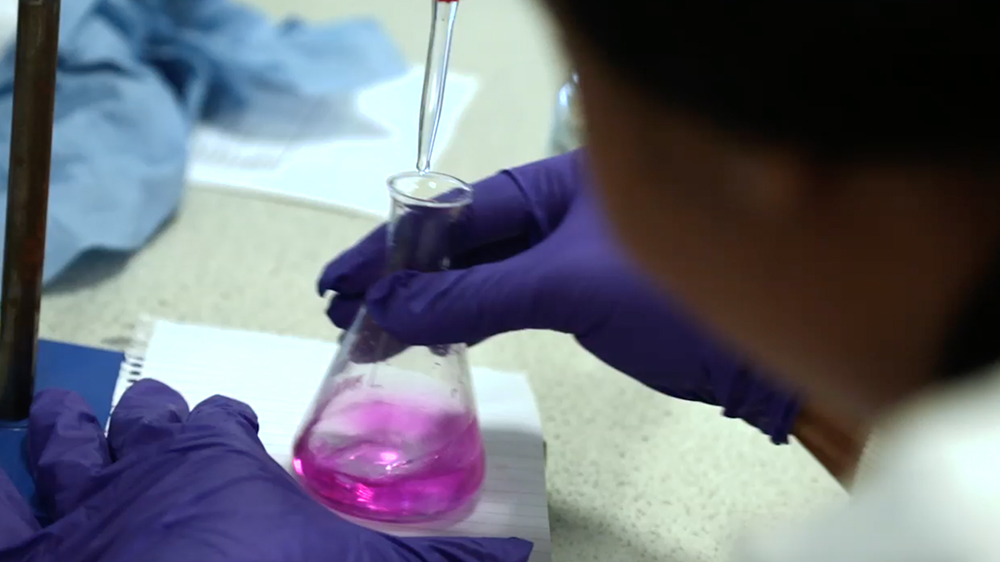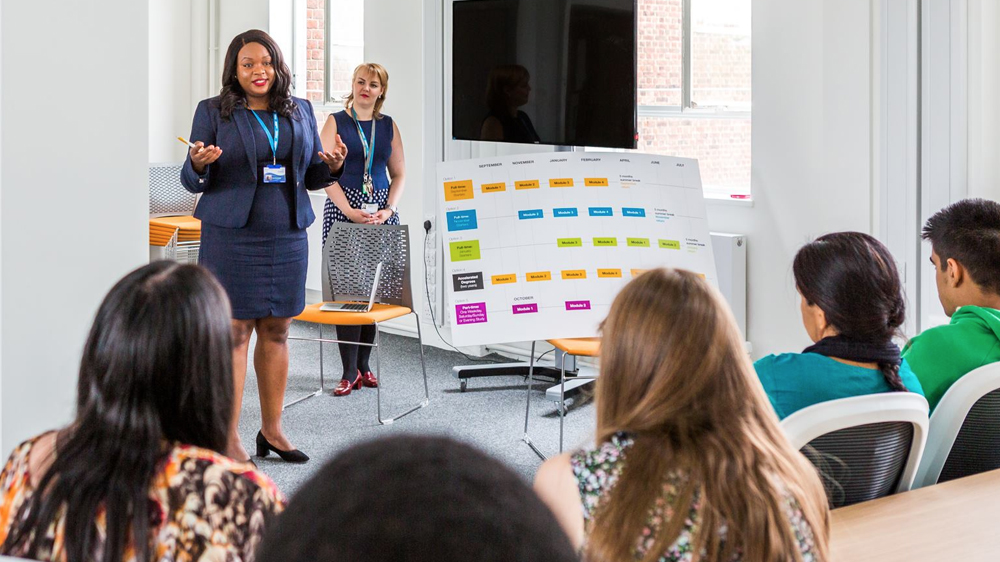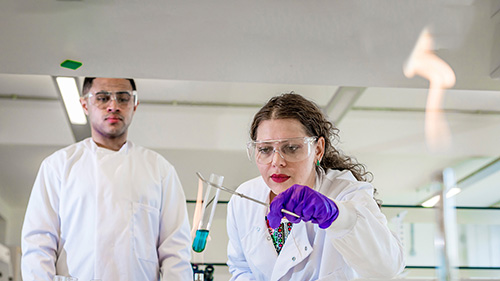Search
Applied Biosciences BSc (Hons)
Study level: UndergraduateHNC/HND courses

This Applied Biosciences BSc (Hons) course explores life at all levels from chemicals, molecules and cells to organ systems, laying the foundation for a career in human health and disease.
Course features
Course option
Year of entry
Location
CU London (Dagenham, London)
Study mode
Full-time
Sandwich
Duration
4 years sandwich
3 year - Degree
2 year - HND
1 year - HNC
UCAS codes
CF11 / 112C / 11FC
Start date
January 2026
March 2026
May 2026
June 2026
Course overview
The course aims to provide you with a solid grounding for building a career in the health and bioscience sectors.
It explores life at all levels from chemicals, molecules and cells to organ systems. You will also explore human health and illness and how they are managed in the context of contemporary research, as well as how populations, communities and the environment influence health and illness.
Course content and assessments have been designed to help you develop theoretical knowledge and understanding, as well as practical skills to enhance your career and academic opportunities.
The course is reviewed periodically to ensure it includes the major causes of illness and death globally as researched by the World Health Organisation (WHO), as well as the major causes of sickness absence from the workplace to give you a well-rounded understanding of the way disease affects human life.
Why you should study this course
The course aims to develop autonomous scientists of the future – so you will know where and what to look for as you face scientific challenges and workplace challenges throughout the course.
Bioscientists work all over the world in a wide variety of jobs and careers that require knowledge and application of science, from research to business and from regulation to teaching. Settings include research and development laboratories (for example microbiology, marine science and immunology), biotechnology companies, classrooms, sales representatives and the food and drink industry.
What you'll study
We regularly review our course content, to make it relevant and current for the benefit of our students. For these reasons, course modules may be updated.
How you'll learn
This course is available as a full-time three-year or optional four-year sandwich course, the latter incorporating a work placement or study year in a related field2.
Our teaching methods are varied, offering several teaching styles to suit the needs of all our students, so in addition to lectures, we also utilise a blended learning approach which includes online aspects, workshops and group work. Additional support is available via email and our online learning platform, which is currently Aula.
Progression through the modules develops knowledge and skills, including communication (written and oral), study skills, research methods, project management, presentation and career development. We will also encourage you to consider your employability and/or entrepreneurial development.
Unlike traditional institutions, there are no end-of-year exams. Instead, learning is assessed through coursework and phase tests, which are more reflective of our learning model.
Teaching contact hours
As a full-time undergraduate student, you will study modules totalling 120 credits each academic year. A typical 20 credit module requires a total of 200 hours study. This is made up of teaching contact hours, guided and independent study.
Teaching hours:
Teaching hours vary each semester, year of study and due to module selection. During your first year you can expect 15-18 teaching hours each week. You will also have the option to attend optional sessions including time with a progress coach or to meet with staff for advice and feedback. As you progress through your studies, teaching hours may reduce.
Guided and independent study:
Throughout your studies, you will be expected to spend time in guided and independent study to make up the required study hours per module. You'll be digging deeper into topics, review what you've learnt and complete assignments. This can be completed around your personal commitments. As you progress through your studies, you'll spend more time in independent study.
Online learning:
As an innovative university, we use different teaching methods including online tools and emerging technologies. So, some of your teaching hours and assessments may be delivered online.
Assessment
The learning outcomes of modules, assignments and projects will be clearly stated. Your work will be marked according to how well you achieve these learning outcomes and your final feedback will refer to each outcome, as well as providing an overall percentage grade.
This course will be assessed using a variety of methods which will vary depending upon the module. The assessment methods may include: practical class and project performance, written practical reports, project thesis, laboratory experiments, tutorial tasks and assessments.
The Coventry University Group assessment strategy ensures that our courses are fairly assessed and allows us to monitor student progression towards achieving the intended learning outcomes.
International experience opportunities
You may have the opportunity to attend international visits2 with academic or industry collaborative partners. Furthermore, a number of modules across the course may have collaborative online international learning (COIL) projects embedded within them, allowing you to gain valuable experience working with peers, both at Coventry University and global collaborative institutions.
Please note that all international experience opportunities may be subject to additional costs, competitive application, availability and meeting applicable visa and travel requirements are therefore not guaranteed2.
Entry requirements
Typical entry requirements:
Fees and funding
| Student | Full-time | Part-time |
|---|---|---|
| UK, Ireland*, Channel Islands or Isle of Man | £9,535 per year | Not available |
| EU | £9,535 per year with EU Support Bursary** £14,800 per year without EU Support Bursary** |
Not available |
| International | £14,800 per year | Not available |
If you choose to study this course with a professional placement2 or study abroad year, you will need to pay a tuition fee3 to cover your academic support throughout your placement year. Students commencing their professional placement in the academic year 2027/28 will pay £1,500 if they are paying UK fees, or £1,800 if they are paying international fees.
For advice and guidance on tuition fees and student loans visit our undergraduate finance page and see the university’s Tuition Fee and Refund Terms and Conditions.
The University will charge the tuition fees that are stated in the above table for the first Academic Year of study. The University will review tuition fees each year. For UK (home) students, if Parliament permits an increase in tuition fees, the university may increase fees for each subsequent year of study in line with any such changes. Note that any increase is expected to be in line with inflation.
If you choose to study this course with a professional placement, the University will charge the tuition fees stated above for those on a placement during Academic Year 2027/28. The University will review professional placement tuition fees each year. For UK (home) students, the University may increase fees for each subsequent year of study, but such that it will be no more than 5% above inflation.
For international students, we may increase fees each year, but such increases will be no more than 5% above inflation. If you defer your course start date or have to extend your studies beyond the normal duration of the course (e.g. to repeat a year or resit examinations) the University reserves the right to charge you fees at a higher rate and/or in accordance with any legislative changes during the additional period of study.
We offer a range of international scholarships to students all over the world. For more information, visit our international scholarships page.
Tuition fees cover the cost of your teaching, assessments, facilities and support services. There may be additional costs not covered by this fee such as accommodation and living costs, recommended reading books, stationery, printing and re-assessments should you need them.
The following are additional costs not included in the tuition fees:
- Any optional overseas field trips or visits: £400+ per trip.
- Any costs associated with securing, attending or completing a placement (whether in the UK or abroad).
*Irish student fees
The rights of Irish residents to study in the UK are preserved under the Common Travel Area arrangement. If you are an Irish student and meet the residency criteria, you can study in England, pay the same level of tuition fees as English students and utilise the Tuition Fee Loan.
**EU Support Bursary
Following the UK's exit from the European Union, we are offering financial support to all eligible EU students who wish to study an undergraduate or a postgraduate degree with us full-time. This bursary will be used to offset the cost of your tuition fees to bring them in line with that of UK students. Students studying a degree with a foundation year with us are not eligible for the bursary.
Facilities
You’ll be based in the spacious building at Dagenham campus, which provides an outstanding learning environment including a science laboratory and a library that includes loan laptops, print copies of essential and recommended reading, over 115,000 eBooks and a quiet study area.
CU London Dagenham campus is in the Civic Centre building and is easily accessible by road, bus and rail.
Our facilities include:
- science labs where students like you - studying science-related degrees - can conduct experiments, gather data and perform various scientific investigations
- engineering labs with instruments and equipment that support research, experimentation and practical learning in the field of engineering
- classrooms with interactive teaching capabilities
- comprehensive library and learning services
- study areas, laptops/open-access computers and social spaces
- student support and careers advice teams
- onsite free student parking.
Facilities are subject to availability. Access to some facilities (including some teaching and learning spaces) may vary from those advertised and/or may have reduced availability or restrictions where the university is following public authority guidance, decisions or orders.
Careers and opportunities
On successful completion, you will be able to:
- understand the fundamentals of biological and chemical sciences, including cell biology, chemistry and physiology. You will develop a core understanding of the sciences, with applications to industry and the health sector
- develop appropriate research and analysis techniques, alongside the ability to undertake reliable scientific research activities
- operate, lead and collaborate in a team to solve problems of a practical (experimental) nature and to provide appropriate solutions
- apply appropriate presentation and evaluation tools to establish the significance of the research data produced.
With a degree, your chances of employment are improved and the level at which you enter the job market could mean a higher salary.
On graduation, you will have a portfolio of employability skills across a range of science disciplines, which could give you an advantage over other candidates. You could go on to work in different disciplines including studying towards postgraduate qualifications, working within laboratory-based industries, technical posts within education or industry, research technician or even teaching in science. The degree also provides you with a strong set of transferable skills valued by employers.
Where our graduates work
Graduates have gone on to work at a number of national and international companies such as GlaxoSmithKline, HelloFresh, Oxford Immunotec and ALS Environmental.
Further study
Graduates have progressed into further education, undertaking a master’s degree in related subjects such as Biotechnology, Cancer Research, Pharmacology and Drug Discovery, Molecular Microbiology, Medical Sciences and Polymer Chemistry.









